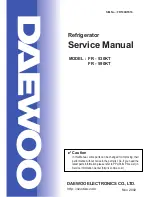
8
Service Information
All
units are designed for maximum durability, reliability and
simplicity.
comes to you ready for operation, fully charged and
with all controls preset at the factory. The following information is
provided as an aid in the event that service is required.
Maintenance
The evaporator section of a
system should be checked at
least once for proper defrosting because the amount and pattern
of frosting can vary greatly. The frost build-up is dependent on
the temperature of the room, the type of product being stored,
how often new product is brought into the room and percentage
of time the door to the room is open. It may be necessary to
periodically change the number of defrost cycles or adjust the
duration of defrost.
System Standard Maintenance Guidelines
After first year of operation and under normal usage, maintenance
should cover the following items at least once every six months:
1. Check and tighten
ALL
electrical connections.
2. Check all wiring and insulators.
3. Check contactors for proper operation and for worn
contact points.
4. Check all fan motors. Tighten motor mount bolts/ nuts
and tighten fan set screws.
5. Clean the condenser coil surface.
6. Check the operation of the control system. Make certain
all safety controls are operating properly.
7. Check that all defrost controls are functioning properly.
8. Clean the evaporator coil surface.
9. Clean the drain pan and check the drain pan and drain line
for proper drainage.
Refrigeration Sequence of Operation
1. Power is provided to the temperature control, compressor
contactor and cooler evaporator fans.
2. The temperature controller closes and energizes the
compressor contactor, starting the compressor,
evaporator and condenser fan(s).
3. When the system reaches the desired box temperature,
the temperature control will de-energize the compressor
contactor. Evaporator fans will continue to operate at
this point.
4. When the fixture temperature rises above the set point
and minimum off-time has elapsed, the temperature
control will close and re-energize the compressor contactor.
Electric Defrost Sequence of Operation
for Freezers
1. During normal operation, at the preset time intervals,
the temperature/defrost control will de-energize the
compressor contactor and evaporator fans and energize
the defrost heaters. These functions are controlled
through relays on the controller.
2. When the coil has defrosted fully and has reached the
preset coil temperature (as sensed by the coil
temperature sensor) the defrost heater de-energizes
and the fan delay and drip sequences begin.
3. The temperature/defrost control energizes the
compressor contactor, starting the compressor and
condenser fan(s).
4. Freezer evaporator fans will be energized by the
temperature/defrost control when the coil temperature
reaches 35°F or fan delay time has elapsed.
Freezer Defrost Control -
Medium & Large Cabinet
freezer units come factory equipped with an electronic
temperature/defrost control. There are 2 different models of
electronic control used and it is important to determine which
one is present on your unit before altering any factory settings.
Please refer to the picture of the controller display on this page
to determine the model used. Instructions for any necessary
reprogramming are included in this manual on pages 8-10.
Medium and Large Cabinet Freezers
Dixell Electronic Controller
The Dixell XR-60CX and the Dixell XR-60C are fully
configurable electronic refrigeration controllers. All
parameter values are reprogrammable and are stored in the
non-volatile memory.
The controllers use two levels of programming that can be
accessed through the keypad. The first level is the user level.
It gives access to six settings; temp. differential, defrost cycle
intervals, defrost termination temperature, draining time,
defrost fan delay, and fan stop temperature.
The second level is the service level. It allows access to all
other parameters. It is recommended that changes in this
level be made only by a qualified technician.
Front Panel Commands
XR-60CX Controller XR-60C Controller
USE OF LEDS
Each LED function is described in the following table.
LED
LED MODE
FUNCTION
ON
Compressor enabled
Flashing
-Programming Phase (flashing with )
- Anti-short cycle delay enabled
ON
Defrost enabled
Flashing - Programming Phase (flashing with )
- Drip time in progress
ON
Fans enabled
Flashing
Fans delay after defrost in progress
(60CX only)
ON
A temperature alarm occurred
2.
Fr
eez
ers






































